A round-up of activities of the UN system in Somalia in August 2024
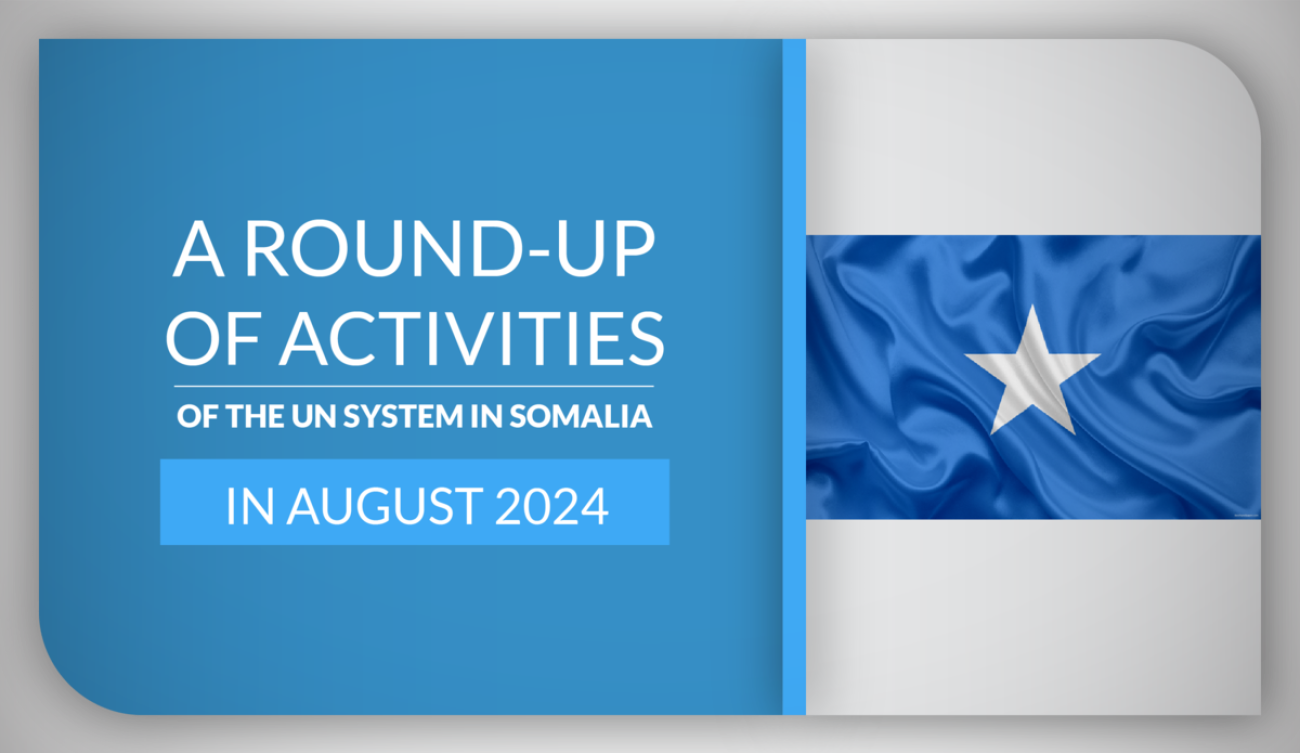
Highlights of some the activities of the United Nations in the month of August, 2024
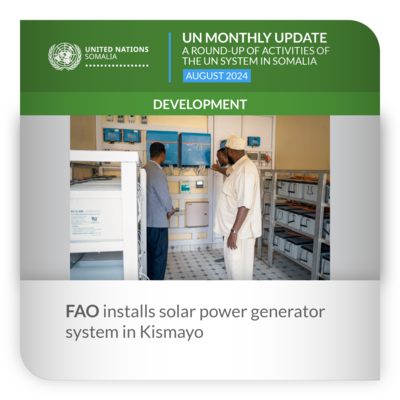
Development | FAO installs solar power generator system in Kismayo
FAO installed a state-of-the-art solar power generator system at the fish market in Kismayo, city of Jubaland, for the benefit of the local community and to enhance market efficiency.
The system is part of FAO’s RAAISE project, which falls under the European Union’s ‘Inclusive Local and Economic Development’ programme. The latter aims to contribute to stability in Somalia by extending state authority and services, promoting local reconciliation and peacebuilding, creating inclusive economic opportunities and protecting the most vulnerable.
According to FAO, the innovative generator system provides sustainable and reliable energy essential for maintaining fish quality and supporting local livelihoods.
RAAISE, which stands for ‘Resilient Fisheries and Livestock Value Chain for Inclusive and Sustainable Growth in Somalia,’ is designed to enhance resilience against climate variability and conflict by improving institutional capacities, value chain development, and regulatory frameworks across Somalia.
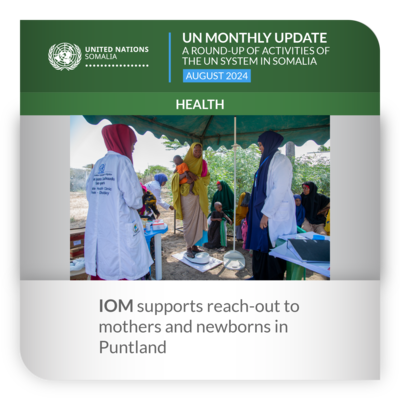
Health | IOM supports reach-out to mothers and newborns in Puntland
In Garowe, the capital of Puntland, IOM and the Federal Member State’s Ministry of Health worked together to overcome geographical barriers and deliver essential healthcare services directly to displaced populations.
Through seven mobile clinics, IOM provided critical medical care to the communities of Burtinle, Dan Gorayo, Xamur, Abaarey, Garowe, Godobjiran and Jariban, with a focus on post-natal care.
Since the launch of the first mobile clinic in May 2013, IOM has reached thousands of Somalis with services including routine consultation, maternal health, nutrition and immunizations.
According to IOM, vehicles equipped with essential medical supplies, and staffed by dedicated healthcare professionals, bring vital infant and young child feeding services directly to the heart of underserved communities.
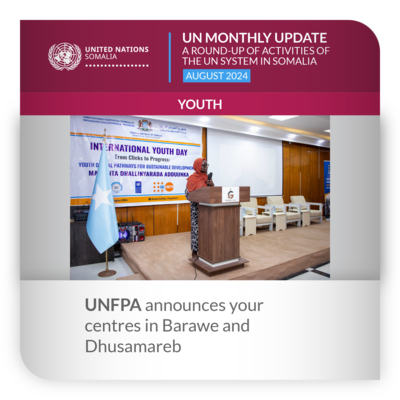
Youth | UNFPA announces youth centres in Barawe and Dhusamareb
At an event in Mogadishu to celebrate International Youth Day, marked on 12 August annually, UNFPA announced the inauguration of two new youth centres in Barawe and Dhusamareb.
In her remarks at the event, UNFPA’s Acting Representative for Somalia, Dr. Mary Otieno, said the centres would be vital hubs for digital learning, entrepreneurship, and innovation, empowering young people with the skills needed for a sustainable future. She also stressed the importance of investing in youth for sustainable development.
The celebration was held under the theme for this year’s observance: ‘From Clicks to Progress: Youth Digital Pathways for Sustainable Development.’
The event featured speeches from key figures, including the Minister of Youth and Sports, Mohamed Bare, who highlighted the critical role of youth in Somalia's progress.

Immunization | UNICEF accelerates progress towards immunizing every child
The Government of Somalia, WHO and UNICEF combined efforts to accelerate progress towards immunizing every child.
Firstly, Somalia’s Prime Minister Hamza Abdi Barre launched the Somalia Immunization and Polio Eradication (SIPE) Task Force, which will oversee and coordinate polio eradication and immunization efforts across the country using lifesaving vaccines.
Secondly, the ‘Big Catch-up’ initiative was launched simultaneously in the country’s Federal Member States (FMSs).
The initiative is ongoing nationwide and aims to reach 1.5 million under-five children who have never received a vaccine, and under-immunized children.
According to UNICEF, getting children vaccinated is safe and life-saving, and prevention is better than seeking a cure.

Humanitarian | OCHA and Somali government mark World Humanitarian Day
Marking World Humanitarian Day this year, the humanitarian community in Somalia – led by the Humanitarian Coordinator for the country, George Conway – called on all parties to protect civilians and humanitarian workers in areas of conflict.
Somalia has been experiencing one of the world’s most serious humanitarian crises with millions of people exposed to suffering due to recurring and intensifying climate shocks, protracted conflicts, disease outbreaks, and economic shocks.
So far this year, 124 incidents affecting humanitarian access have been recorded, including 12 aid workers injured in the process of delivering aid and 13 incidents of physical assault, harassment and intimidation. Also, two aid workers have been killed this year in the line of duty. In 2023, four aid workers were killed.
OCHA held events to mark the day with representatives from the humanitarian community in Mogadishu, Garowe, Baidoa and Dhusamareb.
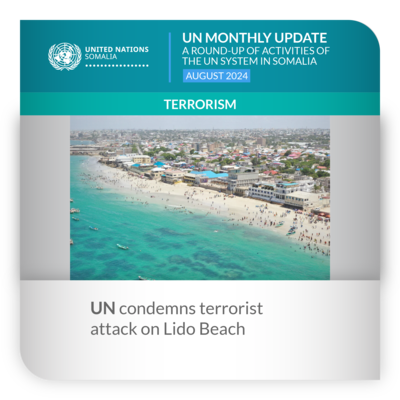
Terrorism | UN condemns terrorist attack on Lido Beach
The United Nations in Somalia strongly condemned the Al-Shabaab terrorist attack that took place at Mogadishu’s Lido Beach in early August, reportedly killing at least 32 people and injuring many more.
In a statement, the United Nations in Somalia expressed its deepest condolences to the families of the victims and wished a speedy recovery for the injured.
“Lido Beach is a popular place for Somalis to spend time with family and friends and enjoy the beauty of the Somali coastline. Targeting this location is an abhorrent act that warrants the firmest condemnation,” the UN Secretary-General’s Acting Special Representative for Somalia, James Swan, said in a statement.
“As we join all peace-loving Somalis in mourning this sad loss, I reaffirm the United Nations’ support for and solidarity with the Federal Government of Somalia in its efforts to ensure peace, security, and stability in the country,” he added.

Demining | UNMAS strengthens capacities of the Somalia Explosive Management Authority
UNMAS delivered humanitarian mine action and quality assurance training to 13 representatives from the Somalia Explosive Management Authority (SEMA) hailing from Somalia’s Federal Member States and the capital, Mogadishu.
The training aimed to strengthen participants’ capacity to implement quality assurance processes and to monitor the safety and efficiency of demining operations. Sessions included both theory and practice components to enhance the regulator’s capability to coordinate mine action activities in the country.
The theoretical phase of the training covered demining, surveys, explosive ordnance risk education, quality assurance and data verification, among other topics. During the practical phase of the training, the participants returned to their respective stations to conduct practical inspection of ongoing tasks conducted by mine action operators, applying the knowledge they had acquired.
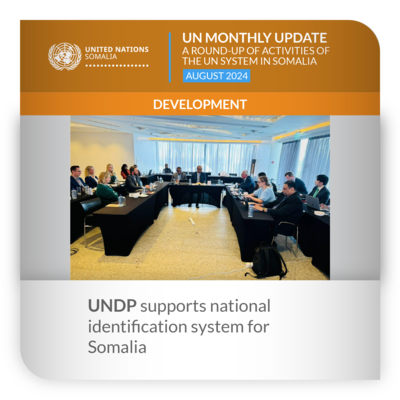
Development | UNDP supports national identification system for Somalia
UNDP and the Somali National Identification and Registration Authority (NIRA) held a donor debriefing session in Nairobi, Kenya, focused on the preliminary findings of a joint NIRA-UNDP mission.
That mission was aimed at evaluating the governance framework for National Identity and Digital Public Infrastructure, as well as the challenges in implementing an inclusive, transparent, and rights-based digital identity system.
The debriefing session was chaired by the Deputy Minister of Interior, Federal Affairs and Reconciliation, Abdihakim Hassan Ashkir, alongside the NIRA’s Director General, Abdiwali Abdulle.
UNDP remains committed to supporting NIRA by fostering consultations, strengthening institutional capacity, and enhancing civic education. These efforts are aimed at ensuring the effective implementation of Somalia’s national ID system.

Defence| UNSOS trains Somali security personnel on communication systems
Amid offensive efforts against the Al-Shabaab terrorist group, UNSOS organized a training in Mogadishu for 20 Somali security personnel on modern communication systems.
The training, organised by UNSOS’ Field Technology Section, was part of ongoing capacity-building efforts to prepare the Somali National Armed Forces (SNAF) and Somali Police Force (SPF) to assume security responsibilities from the African Union Transition Mission in Somalia (ATMIS) at the end of 2024.
The hands-on training was conducted over five days, and focused on the Motorola communication systems to enable the SNAF and SPF personnel to build the technical capacity required.
“The training and equipping of the Somali Security Forces has enabled and improved the working conditions and interoperability between the army and police. We thank UNSOS for this tangible support extended to us at this critical period when so much transformation is happening within the armed forces,” said Somalia’s Chief of Defence Forces Maj. Gen. Ibrahim Sheikh Muhyadin.






